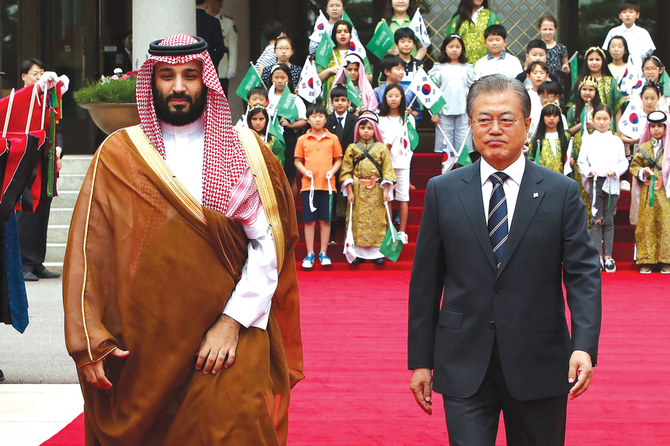SEOUL: Crown Prince Mohammed bin Salman’s history-making visit to South Korea has taken Saudi Arabia a step closer to achieving its Vision 2030 economic transformation following the establishment of a joint “Vision Realization Office” that will expand business cooperation between the two countries beyond their traditional oil partnership.
The crown prince met with South Korean President Moon Jae-in at the presidential Blue House after being welcomed by Prime Minister Lee Nak-yeon at a VIP airfield in Seongnam, south of Seoul, earlier on Wednesday. It is the first visit to South Korea by an heir to the throne of the world’s largest oil exporter in more than two decades.
The crown prince, who also serves as deputy prime minister and minister of defense, stressed that he would invest more in South Korea, focusing on expanding bilateral collaboration in the fields of energy, automotive, tourism and health.
“South Korea has made tremendous success in Saudi Arabia. I hope South Korea will do the same to further improve the bilateral relationship,” the crown prince was quoted by a Blue House spokesman as saying.
“People of both countries will thrive through cooperation in the sectors of defense and economy.”
Moon pledged to provide full support for Saudi Arabia’s efforts to diversify its economic portfolio, breaking away from its dependence on the energy segment.
The two leaders discussed ways of boosting their relationship, with a focus on the new industrial sectors of information and communications technology, hydrogen energy, robots, health, medical service and culture.
Both sides “reaffirmed their strategic partnership regarding Saudi Vision 2030,” a joint press release said. “In this regard, the two leaders agreed to set up the ‘Vision Realization Office’ in both Riyadh and Seoul, respectively, as part of efforts to expedite bilateral efforts for the successful Vision 2030 partnership.”
At a luncheon hosted by Moon, South Korea’s business tycoons greeted the crown prince and other Saudi delegates.
Among the business leaders were Lee Jae-yong, vice chairman of Samsung Electronics; Chung Eui-sun, vice chairman of Hyundai Motor Group; Chey Tae-won, chairman of SK Group; LG chairman Koo Kwang-mo; and Chung Ki-sun, senior executive vice president of Hyundai Heavy Industries.
“I hope companies from both nations can set up a strategic and cooperative relationship through vibrant business activity,” the crown prince said.
Later in the day, he was invited to Samsung’s VIP guesthouse in Itaewon, Seoul, for more discussions on business partnerships with young South Korean representatives, a Samsung spokesman told Arab News.
IN NUMBERS
• $8.3bn - Estimated worth of economic deals signed on Wednesday
• 16 - Number of MoUs between the two governments, including agreements related to eco-friendly automobile technology and hydrogen energy
• 15 - Number of MoUs signed by the Saudi business delegation
• $6bn - Value of the deal signed by Saudi Aramco and S-Oil, South Korea’s third-biggest oil refiner, to build refinery and downstream facilities in South Korea
• $1.8bn - Cost of developing a propane dehydrogenation and polypropylene complex in Jubail, a joint project between SK Gas and Saudi’s Advanced Petrochemical (APC)
According to the Blue House spokesman, Seoul and Riyadh signed a total of 16 memorandums of understanding (MoUs), including agreements related to eco-friendly automobile technology and hydrogen energy.
“Based on the latest MoUs with Saudi Arabia, South Korean companies will lay the groundwork for advancing into the Middle East region in the fields of green cars, hydrogen energy supply, hydrogen fuel cell and others,” Minister of Trade, Industry and Energy, Sung Yun-mo, told reporters.
On top of the government agreements, eight MoUs between companies have been signed. The value of the agreements is estimated at $8.3 billion, the minister added.
Among the lucrative business deals are Saudi Aramco’s petrochemical project with S-Oil, South Korea’s third-biggest oil refiner. Under the $6 billion deal the refinery will build a facility to produce ethylene and other basic chemicals out of naphtha and refinery off-gas, as well as olefin downstream facilities in Ulsan, about 400 km southeast of Seoul, by 2024.
Another high-profile agreement is on hydrogen cars. “The collaboration of Hyundai and Saudi Aramco will cover not only existing projects but also future-oriented business plans,” Chung Eui-sun, Hyundai’s vice chairman, said in a statement.
“This MoU will be an opportunity to help further solidify our strategic cooperative partnership,” he added.
Under the partnership, the two companies will cooperate in establishing hydrogen-charging infrastructure in South Korea and supply hydrogen fuel-cell electric cars in Saudi Arabia.
Other MoUs include Aramco’s joint investment with Hyundai Heavy Industries to build a ship engine plant in the King Salman Global Maritime Industries Complex, and a joint project between SK Gas and Saudi’s Advanced Petrochemical (APC) to develop a $1.8 billion propane dehydrogenation and polypropylene complex in Jubail.
On a political note, Moon and the crown prince condemned terror activities harming energy security and regional stability in the Middle East, including this week’s deadly attack by Yemen’s Houthi rebels on Abha’s civilian airport in southern Saudi Arabia.
The crown prince promised to help with South Korea’s possible fuel shortages in case of supply disruption caused by tensions in the Middle East, while both leaders called for international efforts to secure energy safety at the Strait of Hormuz, where two Japanese oil tankers were struck by unidentified attacks.
South Korea imported 101.5 million barrels of crude oil from Saudi Arabia, Seoul’s biggest oil supplier, in the first four months of this year, down 2.7 percent from a year ago, according to data from state-run Korea National Oil Corp.






























